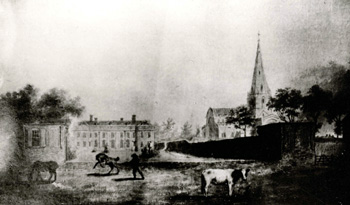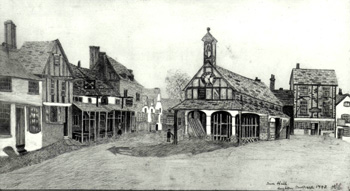Leighton Buzzard Education Before 1812

All Saints church and the Prebendal House in 1797 [P91/28/40]
There are some tantalizing references to early education in Leighton Buzzard. The first of these is about 1678 when John Bradshaw, from Cublington [Buckinghamshire] wrote a letter to a friend in which he stated [Fac18/5]: "in my last I named Leighton in Bedfordshire as the place of a free school. I thought so great a market town was not unlikely to have such a privilege But the master of the schoole coming to see me at my house told me the schoole was not free". This master was probably Edward Hargrave, whose memorial is in the chancel floor of All Saints in which it states that he died in 1707, having been the master of Leighton School for 52 years - so from about 1655. The school as presumably kept in the church, as noted in 1706 below.
Volume 81 published by Bedfordshire Historical Records Society (2002) is a series of episcopal visitations undertaken in the first twenty years of the 18th century, edited by former County Archivist Patricia Bell. At each visitation a list of questions was sent out in advance, one of which enquired about the provision of schools in each parish. The various replies for Leighton Buzzard were as follows:
- 1706: "There is a School kept in the North-Wing of the church of Leighton. The Master of which has £10 a year for teaching 10 poor Children, the late gift of Charles Leigh Esquire";
- 1709: No Schole save as above [presumably meaning the return of 1706]. They are taught the Church Catechism, with Mr.Lewis' explications";
- 1717: "One [school], the gift of the late Honourable Charles Leigh, endowed with tenn pounds per Annum for the teaching of tenn poor children of Leighton aforesaid who are taught the Church Catechism, with Bishop Williams's exposition of both which my custom is during the whole winter season, to make a select number give an account every Sunday in the afternoon";
- 1720: "There is a charity schooll where ten boys are taught for ten pound a year, and educated in the Principles of the Church of England"
Parish registers note the burial of James Hill, schoolmaster, in 1724 and Thomas Wardle, schoolmaster in 1746. These two men presumably taght at the school held in the church and supported by Charles Leigh. This school may have moved to an upper chamber of the Market House in the Market Square by the end of the 18th century (the house was owned by the tenants of the Manor of Leighton alias Grovebury who were the Leigh family from 1610 until some time around 1831). George Arnald mentions this school around 1770: "Leighton thy market house remembered oft, Where Young the cruel kept his school aloft" [Z693/1]. The poem goes on to describe schoolboys stealing baked pears from Young's wife.

The Market House in 1798 [Z50/72/38]
Other indications of 18th century schools come from Nonconformist records. The Lake Street Baptist church was founded by Joseph James in 1775 until ill health foced him to give up in 1789. James also taught a daily school which was taken over by his successor Thomas Wake who noted that he had "the constant business of my school every day". Wake resigned the ministry in 1827 and it is not known whether his school continued or where it met.
Around the year 1800 the Charity Commissioners began to investigate the educational charities of Bedfordshire. They discovered two in Leighton Buzzard.
Leigh's Charity
Charles Leigh's will was dated 5th June 1704 and in it, as noted above he gave £10 per annum to support a schoolmaster in Leighton Buzzard. The master was expected to teach ten poor boys, chosen by the Vicar and Churchwardens of All Saints. The boys were to attend morning prayers daily, if they failed to do so they lost their place at the school. The boys were taught reading, writing and arithmetic.
Pulford's Charity
Joshua Pulford's will was dated 10th May 1710 and in it he left property and land, the income from which was designed to support the Vicar of Leighton Buzzard, so that his stipend reached £100 a year. Any surplus income was to be used to educate poor children. As the value of the land fell so the surplus fell and to make up the difference the Vicar took to donating two guineas per annum to a school in the town.